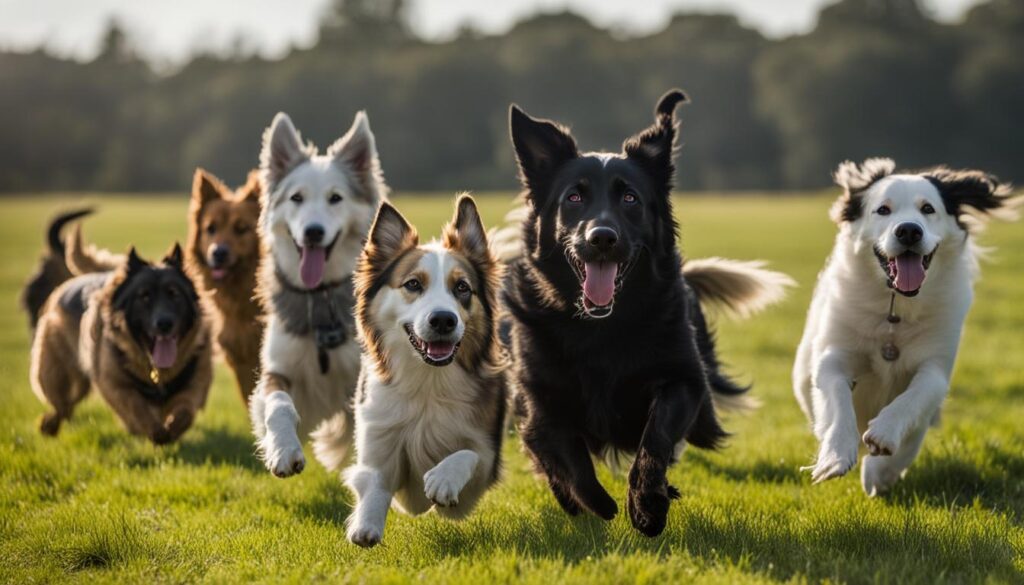Training your dog is a commitment that requires trust, consistency, and an understanding of their natural tendencies. Did you know that different dog breeds have unique characteristics that impact their trainability? From Border Collies with their herding instincts to feisty terriers and hunting hounds, each breed requires tailored training techniques to bring out their best.
Key Takeaways:
- Breed-specific dog training takes into account the unique characteristics of each breed
- Understanding breed behavior can help address behavior problems in a targeted manner
- Training methods play a significant role in training outcomes
- Customized training plans optimize learning and development based on breed
- Energetic breeds, stubborn breeds, and sensitive breeds require different training approaches
The Impact of Breed-Specific Training on Behavior Problems
Undesirable behaviors in dogs can be a challenge for many owners. However, understanding the impact of breed-specific training on behavior problems can provide invaluable insights into effective training techniques. By tailoring training methods to the unique characteristics of each breed, owners can address behavior issues more effectively.
Breed-Specific Traits and Training
Breeds have distinct behavioral traits that influence their trainability and behavior problems. For example, certain breeds may be more prone to aggression or anxiety, while others may have a high prey drive or stubbornness. By understanding these breed-specific traits, trainers can develop targeted training approaches that address these tendencies.
“Tailoring training methods to specific breeds allows for more effective behavior modification and helps create a harmonious bond between the owner and their dog.” – Dog Training Expert
Sensitive dog breeds require a different approach in training. These breeds tend to be more emotionally responsive and may require gentle and calm training techniques. Patience and understanding are key when working with sensitive breeds to build trust and confidence.
Training Approach for Sensitive Dog Breeds
When training sensitive dog breeds, it is important to create a positive and supportive environment. These breeds are more likely to shut down or become fearful with harsh training methods. Instead, focus on rewards, praise, and positive reinforcement to motivate and build confidence.
| Breed | Training Approach |
|---|---|
| Shih Tzu | Gentle training techniques, rewards-based, and short sessions |
| Cavalier King Charles Spaniel | Positive reinforcement, consistency, and patience |
By tailoring training techniques to the specific characteristics of each breed, owners can effectively address behavior problems and create a positive and harmonious relationship with their dogs.

Table: Breed-Specific Training Strategies
| Breed | Training Strategy |
|---|---|
| Border Collie | Engage in agility drills and mentally stimulating activities to fulfill their herding instincts. |
| Bulldog | Use positive reinforcement and consistent training methods to overcome their stubbornness. |
| Shih Tzu | Employ gentle and calm training approaches to accommodate their sensitive nature. |
| Golden Retriever | Utilize their retrieving abilities during training sessions and incorporate positive reinforcement. |
“Each breed has its own unique characteristics, and understanding these traits is crucial in developing effective training strategies.” – Dog Training Expert
The Importance of Breed-Specific Training for Learning and Development
Breed-specific training is crucial for optimizing the learning and development of dogs. By understanding the unique characteristics of different breeds, training techniques can be adapted to suit their specific needs. This ensures that dogs receive the most effective training tailored to their breed’s tendencies.
One important consideration in breed-specific training is the size of the dog. Smaller breeds may require more repetition and reinforcement to learn new commands, while larger breeds may have a greater capacity for learning and faster comprehension. By adapting training methods to account for size differences, owners can effectively teach their dogs and achieve desirable outcomes.
Additionally, breed-specific training takes into account the behavioral traits of different breeds. Breeds with high prey drive or tendencies toward aggression may require additional focus on socialization and self-control training. Tailoring training techniques to address these specific traits helps to mitigate behavior problems and promote overall well-being.
| Breed Size | Training Considerations |
|---|---|
| Small Breeds | Require more repetition and reinforcement |
| Large Breeds | Tend to learn faster and have better short-term memory |
| Breeds with high prey drive | Need focus on socialization and self-control training |
| Breeds prone to aggression | Require training techniques that address aggression tendencies |
Breed-specific training plays a vital role in optimizing the learning and development of dogs. By tailoring training techniques to the unique characteristics of each breed, owners can effectively train their dogs and prevent behavior problems. Whether it’s adapting training for small or large breeds, or addressing specific behavioral traits, breed-specific training ensures that dogs receive the training they need to thrive.
Putting Breed-Specific Training into Practice
Breed-specific training techniques are essential for effectively training different breeds of dogs. When it comes to training energetic breeds, such as Border Collies or Labrador Retrievers, it’s important to provide them with ample exercise and mental stimulation to prevent boredom-related behaviors. These breeds thrive on activity and need outlets for their high energy levels. Incorporating engaging training sessions that utilize their natural abilities, such as agility or retrieving games, can help channel their energy in a positive way.
On the other hand, training stubborn breeds like Bulldogs or Basset Hounds requires a patient and consistent approach. These breeds may be less motivated by traditional training methods, so positive reinforcement and rewards play a crucial role in capturing their attention and encouraging them to learn. It’s important to approach training with persistence and a gentle hand to bring out the best in these determined dogs.
In the case of sensitive breeds like Shih Tzus or Cavalier King Charles Spaniels, a calm and gentle training approach is key. These breeds are known for their sensitivity, and they may not respond well to harsh or forceful training techniques. By using positive reinforcement and focusing on building trust and confidence, you can create a safe and comfortable training environment for these delicate pups.
By tailoring training techniques to the specific needs and characteristics of each breed, you can effectively train your dog and prevent behavior problems. Remember to be patient, consistent, and adapt your approach to suit your dog’s unique personality and learning style.

The Benefits of Breed-Specific Training Techniques
When you customize your training methods to your dog’s breed, you can achieve better results and build a stronger bond with your furry friend. Here are some of the benefits of breed-specific training techniques:
- Improved focus and engagement during training sessions
- Enhanced understanding of your dog’s natural tendencies and behaviors
- More effective communication with your dog
- Prevention and management of behavior problems
- Increased mental stimulation for your dog
By taking the time to understand your dog’s breed and tailoring your training techniques accordingly, you can create a positive and rewarding training experience for both you and your dog.
The Benefits of Breed-Specific Training Classes

Attending breed-specific training classes can be highly advantageous when it comes to training dogs. These specialized classes are designed to cater to the unique needs and characteristics of different breeds, ensuring that the training methods used are tailored to each breed’s specific requirements. By participating in these classes, you and your dog can benefit in several ways.
Structured Learning Environment
One of the key advantages of breed-specific training classes is the structured learning environment they provide. These classes are led by professionals who understand the nuances of training different breeds. They can offer valuable insights, guidance, and support throughout the training process. With a structured curriculum and expert advice, you can ensure that your training efforts are focused and effective.
Socialization Opportunities
Socialization is essential for all dogs, but it can be especially important for certain breeds prone to aggression or fearfulness. Breed-specific training classes provide a controlled setting where dogs can learn to interact with other dogs of similar breeds. This allows for positive socialization experiences, helping to build confidence and develop appropriate behavior. Additionally, you’ll have the opportunity to connect with other dog owners who are facing similar training challenges, creating a support network for you and your furry companion.
Professional Guidance
By attending breed-specific training classes, you gain access to professional trainers who have extensive experience working with different breeds. These trainers understand the breed-specific tendencies, learning capabilities, and training techniques that work best for each breed. Their expertise and guidance can help you navigate any challenges or roadblocks you may encounter during the training process. They can provide personalized advice and training strategies that are tailored to your dog’s breed, ensuring that your training efforts are efficient and successful.
Overall, breed-specific training classes offer a holistic approach to dog training. They take into account the unique characteristics, behaviors, and needs of different breeds, allowing for tailored training methods that ensure the best possible outcomes. Whether you have a energetic breed, a stubborn breed, or a breed prone to certain behavior issues, attending these classes can significantly enhance your dog’s training experience and strengthen the bond between you and your furry friend.
The Impact of Breed-Specific Training on Behavior Modification Therapy
When it comes to addressing behavior problems in dogs, breed-specific training techniques can make a significant difference. By understanding the unique characteristics and tendencies of different breeds, behavior modification therapy can be customized to effectively tackle underlying causes. Whether it’s aggression, separation anxiety, or other undesired behaviors, breed-specific training techniques play a vital role in achieving successful outcomes.
One of the key advantages of breed-specific training techniques in behavior modification therapy is their ability to address genetic tendencies. Each breed has its own set of innate traits and behaviors that contribute to specific issues. By targeting these breed-specific traits, trainers can tailor their approach to address the root causes of behavior problems. This customized approach acknowledges the learning capabilities and genetic predispositions of different breeds, resulting in more successful behavior modification outcomes.
Training differences among dog breeds also come into play in behavior modification therapy. Certain breeds may respond better to specific training techniques based on their natural inclinations. By using breed-specific training methods, trainers can tap into a dog’s inherent traits and leverage them to achieve positive behavioral changes. This approach ensures that the training is not only effective but also takes into account the unique needs and characteristics of each breed.
In conclusion, breed-specific training techniques have a profound impact on behavior modification therapy. By considering the breed-specific traits and training differences among dog breeds, trainers can implement targeted strategies that address the underlying causes of behavior problems. Whether it’s adapting the training approach to genetic tendencies or utilizing breed-specific training methods, this approach leads to more successful outcomes in behavior modification therapy.
FAQ
What is breed-specific training?
Breed-specific training is a training approach that takes into account the unique characteristics and tendencies of different dog breeds. It tailors training techniques to address the specific needs and behaviors of each breed.
How does breed-specific training impact behavior problems?
Breed-specific training allows for targeted methods that address the underlying causes of behavior problems in different breeds. By understanding breed-specific traits, behavior modification therapy can be customized for more successful outcomes.
What role do training methods play in breed-specific training?
Training methods have a significant impact on training outcomes. Positive reinforcement-based techniques have been found to be more effective in reducing behavior problems compared to punishment-based methods. Breed-specific training considers both genetic tendencies and brain size to develop customized training plans and strategies.
How does breed-specific training affect learning and development?
Breed-specific training enhances learning and development by adapting training to the unique characteristics of each breed. Behavioral traits and brain size influence how a dog learns. By understanding these factors, training can be optimized for each individual dog.
How can breed-specific training be put into practice?
Breed-specific training can be put into practice by tailoring training methods to the specific needs of each breed. Energetic breeds benefit from exercise and mental stimulation, while stubborn breeds require patience and positive reinforcement. Sensitive breeds may benefit from gentle and calm training approaches.
What are the benefits of breed-specific training classes?
Breed-specific training classes provide a structured learning environment that caters to the specific needs and characteristics of different breeds. They offer valuable knowledge and guidance from professionals who understand the nuances of training different breeds.
How does breed-specific training impact behavior modification therapy?
Breed-specific training techniques can be applied in behavior modification therapy to address specific behavior problems. By considering breed-specific traits, therapy can be customized to effectively address underlying causes and achieve successful behavior modification outcomes.





